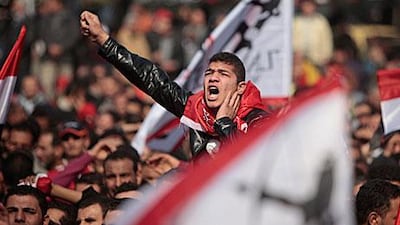Ultra football fans played a key role in last year's revolution. But as accusations fly in the aftermath of the country's worst sporting tragedy, some fans say the violence was not about politics but long-established rivalries inflamed in a security vacuum, James Montague reports
Few could have predicted the scale of the carnage that unfolded on Wednesday night in Port Said. But the deaths highlight a problem that has existed in Egyptian football since long before the revolution.
It was often said before the fall of Hosni Mubarak that there were no political parties in Egypt. Instead, if you were from Cairo, you fell into one of two camps - the red of Al Ahly or the white of Zamalek. Allegiance even trumped religion.
"If you see a policeman they won't ask you whether you are Christian or Muslim," Ayman Younis, a former national team player and television presenter, once said. "They will ask you whether you are Ahly or Zamalek. It is true."
It was in this environment that a series of often vicious football rivalries around the country grew, based on a variety of factors: rich versus poor, capital versus the provinces, successful versus the starved, devout versus liberal.
The Cairo derby was the biggest and the most violent, and it had to be played at a neutral venue with a neutral foreign referee. But clubs from other cities, such as Al Masry, developed intense rivalries with the Cairo teams as well.
Resentment grew against the Cairo clubs, who - opposing fans and owners believed - enjoyed perceived favouritism from the Egyptian football association and the government.
Last April, trouble among fans flared when Al Masry and Al Ahly played in Port Said for the first time after the revolution. Fights broke out and 20 people were injured.
The violence was so bad that many Al Ahly fans travelled back to Cairo instead of staying to watch the game. Later, Al Ahly's players complained to the FA and the ruling military council that their team bus had been attacked with rocks.
Al Masry is not the biggest club in Egypt. They have never won the title in the modern era but boast a passionate, large fan base in Port Said, on the Suez Canal. Al Masry, as with Al Ahly, found their roots in the struggle for Egyptian independence and were born out of the country's first revolution. The club's name means "The Egyptian", and players wear the club's nationalist heart on their sleeves.
But as one ultra from Zamalek said yesterday: "It's not about politics. It [the violence on Wednesday] was the accumulation of mutual aggression between Ahlawy [the Al Ahly ultras] and Port Said people in the past two years and also a lack of security and cops."
And yet politics is never far away. The authorities have largely kept the antagonism among rivals in check, but as Egypt's football ultras started to become much more political and much more anti-authoritarian, that became harder.
Eventually the ultras - especially those of Ahly and Zamalek - played a leading role in last January's revolution as thousands fought in Tahrir Square. As one leader of Al Ahlawy, the ultra group of Al Ahly, put it last April: "Our role was to make people dream, letting them know if a cop hits you, you can hit them back. This was a police state. Our role started earlier than the revolution. During the revolution, there was the Muslim Brotherhood, the activists and the ultras. That's it."
Post revolution, the hated enemy, the police, have been conspicuous by their absence in the football stadiums, letting the spectre of violence raise its ugly head once again.
Riots, fighting and pitch invasions were all commonplace in the security vacuum that followed last year. A vacuum that many Al Ahly fans believe has been allowed to exist by the authorities.
Some even suggest that the violence may have been organised. One of Al Ahly's leaders tweeted his response to Wednesday's tragedy: "It's the army and police way to get back at the ultras for our stand against them in the revolution."
The sheer scale of the tragedy has already prompted questions not just about the role of the authorities but also about the state of many of Egypt's crumbling stadiums, not to mention a football culture that at least partially reveres the more confrontational aspects of the European fan.

